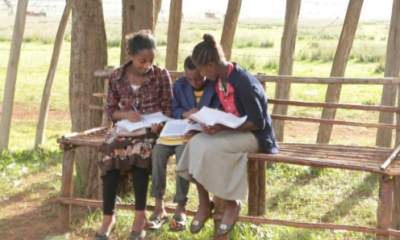
The Young Lives datasets from the first five rounds of household and child surveys, school surveys, and Call 1 to 5 of our COVID 19 Phone Survey are publicly archived and available to download from the UK Data Service.
The Round 4 survey data was archived in March 2016, and the survey documentation is available on the Round 4 documentation page.
The fieldwork for the Round 5 survey was completed in March 2017 and the data was archived in July 2018. The survey documentation is available on the Round 5 documentation page.
The Listening to Young Lives at Work: COVID-19 Phone Survey Call 1 - 3 data was archived in 2020 and is available from the UK Data Service, and the Call 4-5 data was archived in March 2023 and is also available from the UK Data Service.
All of the Phone Survey documentation is also available on our Young Lives at Work project page along with the documentation and questionnaires for each survey round.
For users in our study countries, they are also available on CD-Rom, on request from the Principal Investigator.
Using our data
Users are required to register and apply for a password with the UK Data Service and sign a confidentiality agreement before they can access the data.
We also ask that users retrospectively inform the UK Data Service and Young Lives, using our online form, of any analysis or publications resulting from their work with the dataset.
If you use the Young Lives data in any publication, please follow the UKDS guidelines for citing data and use the following acknowledgement:
‘The data used in this publication come from Young Lives, a 20-year study of childhood poverty and transitions to adulthood in Ethiopia, India, Peru and Vietnam (www.younglives.org.uk). Young Lives is funded by UK aid from the Foreign, Commonwealth & Development Office and a number of further funders. The views expressed here are those of the author(s). They are not necessarily those of Young Lives, the University of Oxford, FCDO or other funders.’
Details of the citation and acknowledgement are also available on the UKDS Young Lives Round 4 documentation page.
Young Lives Quantitative Researcher, Patricia Espinoza Revollo presents a short guide to Young Lives data for beginners and new users.
Data from our longitudinal qualitative research are not archived in the same way as the survey data because of concerns about confidentiality. If you have questions or require further details, please contact Young Lives on younglives@qeh.ox.ac.uk
As part of our ethical commitments, we have guaranteed to protect the anonymity and confidentiality of our study sites and respondents so we only make geographical identifiers available at region level in Ethiopia, district level in India, province level in Peru, and province level in Vietnam. We do not release any location data on a lower level.
Please note that the teachers professional knowledge from the school survey data is also not released as part of our commitment to protecting the confidentiality of our respondents.
If you would like access to data that is not publicly archived then please email younglives@qeh.ox.ac.uk to request a data release form, where you can formally ask for access.
The Young Lives datasets from the first five rounds of household and child surveys, school surveys, and Call 1 to 5 of our COVID 19 Phone Survey are publicly archived and available to download from the UK Data Service.
The Round 4 survey data was archived in March 2016, and the survey documentation is available on the Round 4 documentation page.
The fieldwork for the Round 5 survey was completed in March 2017 and the data was archived in July 2018. The survey documentation is available on the Round 5 documentation page.
The Listening to Young Lives at Work: COVID-19 Phone Survey Call 1 - 3 data was archived in 2020 and is available from the UK Data Service, and the Call 4-5 data was archived in March 2023 and is also available from the UK Data Service.
All of the Phone Survey documentation is also available on our Young Lives at Work project page along with the documentation and questionnaires for each survey round.
For users in our study countries, they are also available on CD-Rom, on request from the Principal Investigator.
Using our data
Users are required to register and apply for a password with the UK Data Service and sign a confidentiality agreement before they can access the data.
We also ask that users retrospectively inform the UK Data Service and Young Lives, using our online form, of any analysis or publications resulting from their work with the dataset.
If you use the Young Lives data in any publication, please follow the UKDS guidelines for citing data and use the following acknowledgement:
‘The data used in this publication come from Young Lives, a 20-year study of childhood poverty and transitions to adulthood in Ethiopia, India, Peru and Vietnam (www.younglives.org.uk). Young Lives is funded by UK aid from the Foreign, Commonwealth & Development Office and a number of further funders. The views expressed here are those of the author(s). They are not necessarily those of Young Lives, the University of Oxford, FCDO or other funders.’
Details of the citation and acknowledgement are also available on the UKDS Young Lives Round 4 documentation page.
Young Lives Quantitative Researcher, Patricia Espinoza Revollo presents a short guide to Young Lives data for beginners and new users.
Data from our longitudinal qualitative research are not archived in the same way as the survey data because of concerns about confidentiality. If you have questions or require further details, please contact Young Lives on younglives@qeh.ox.ac.uk
As part of our ethical commitments, we have guaranteed to protect the anonymity and confidentiality of our study sites and respondents so we only make geographical identifiers available at region level in Ethiopia, district level in India, province level in Peru, and province level in Vietnam. We do not release any location data on a lower level.
Please note that the teachers professional knowledge from the school survey data is also not released as part of our commitment to protecting the confidentiality of our respondents.
If you would like access to data that is not publicly archived then please email younglives@qeh.ox.ac.uk to request a data release form, where you can formally ask for access.



